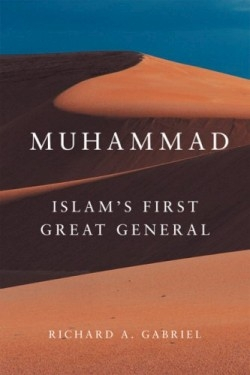Muhammad
Islam's First Great General
In 624 CE, as the battle of Badr raged on, Muhammad ibn Abdallah left his tent to rally his outnumbered army. He declaimed of victory or martyrdom, ensuring his soldiers that “…no man will be slain this day fighting against [the Meccans] with steadfast courage, advancing not retreating, but God will cause him to enter paradise.” His speech so moved the army that they broke through the enemy’s lines and won an impressive victory for the new general.
In Muhammad: Islam’s First Great General, Gabriel, a distinguished adjunct professor at the Royal Military College of Canada and former professor of history and politics at the U.S. Army War College, offers the first military biography of the Prophet of Islam. This book, Gabriel’s fortieth, explores the tale of the religious leader whose command of politics, charisma, and military matters might have helped him conquer and convert much of Arabia. This book offers detailed descriptions of tactics and events at all of Muhammad’s major battles, carefully integrated into discussions of his larger political and military strategies and his lasting impact.
Born in 570 CE, Muhammad had little to do with war until after his revelations, but spent nearly all of the final ten years of his life leading Muslim armies. The influences of his new religion and his leadership over this decade forever changed war and society in the Arab world with his introduction of holy war (jihad), martyrdom (shahada), central leadership, assassination, and more. Gabriel tactfully discusses the importance of these innovations while taking great pains to objectively assess Muhammad’s military record, looking at his decisions and integrating multiple explanations for his successes and failures.
Perhaps most impressively—likely due to his experience—Gabriel demonstrates superb command of the primary literature in the way he engages, compares, questions, and analyzes the sources of Ibn Ishaq and others. He is explicit about what is truly known but avoids bland recounting of events by offering his typically well-reasoned inferences and conclusions. Yet the text is not without the occasional blemish. In addition to a few tautologies, the author, while apt in his conclusions, seems to force his definition of Muhammad as the consummate insurgent and his summary connections to the present-day struggles in Iraq.
On the whole, however, Gabriel brilliantly succeeds in detailing the military life of the Prophet Muhammad while expertly discussing the substantial interconnection of war, politics, and religion. He makes a convincing argument that it was not simply Muhammad’s military accomplishments, but his fundamental transformation of military and cultural life, that allowed his successors to triumph over Persia and Byzantium and further Islam.
Reviewed by
Andrew R. Moore
Disclosure: This article is not an endorsement, but a review. The publisher of this book provided free copies of the book to have their book reviewed by a professional reviewer. No fee was paid by the publisher for this review. Foreword Reviews only recommends books that we love. Foreword Magazine, Inc. is disclosing this in accordance with the Federal Trade Commission’s 16 CFR, Part 255.

